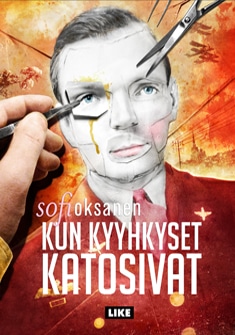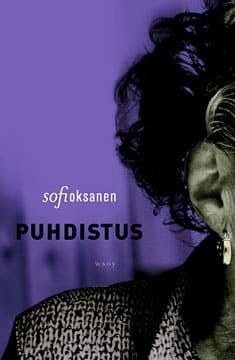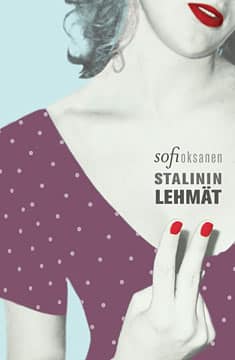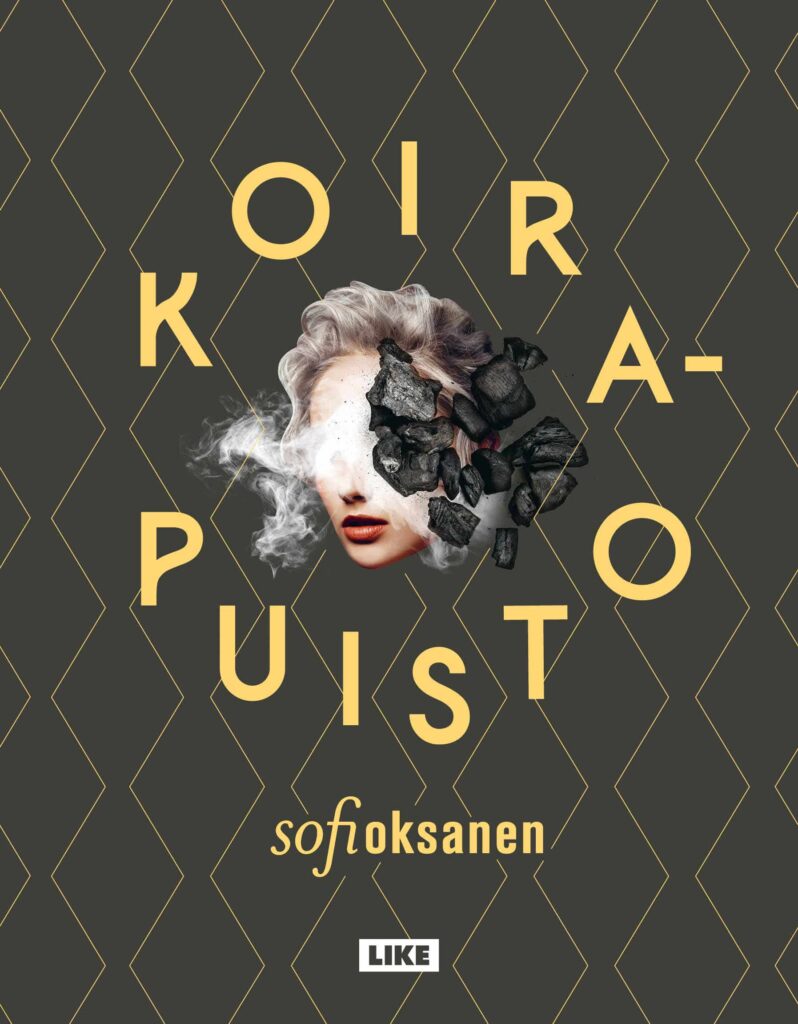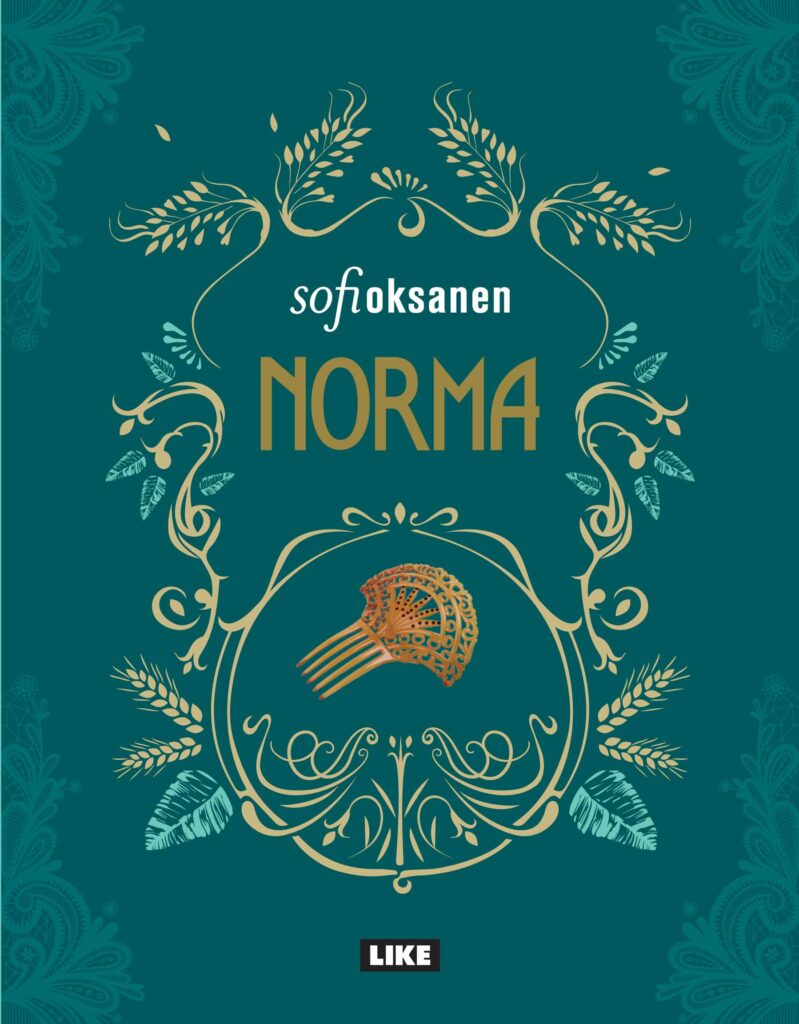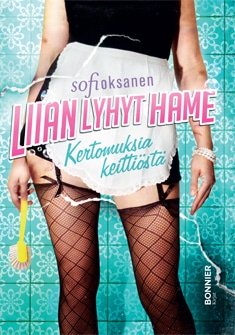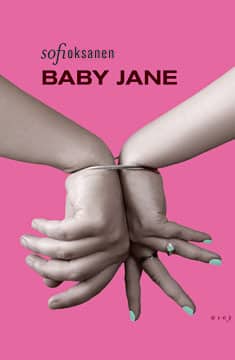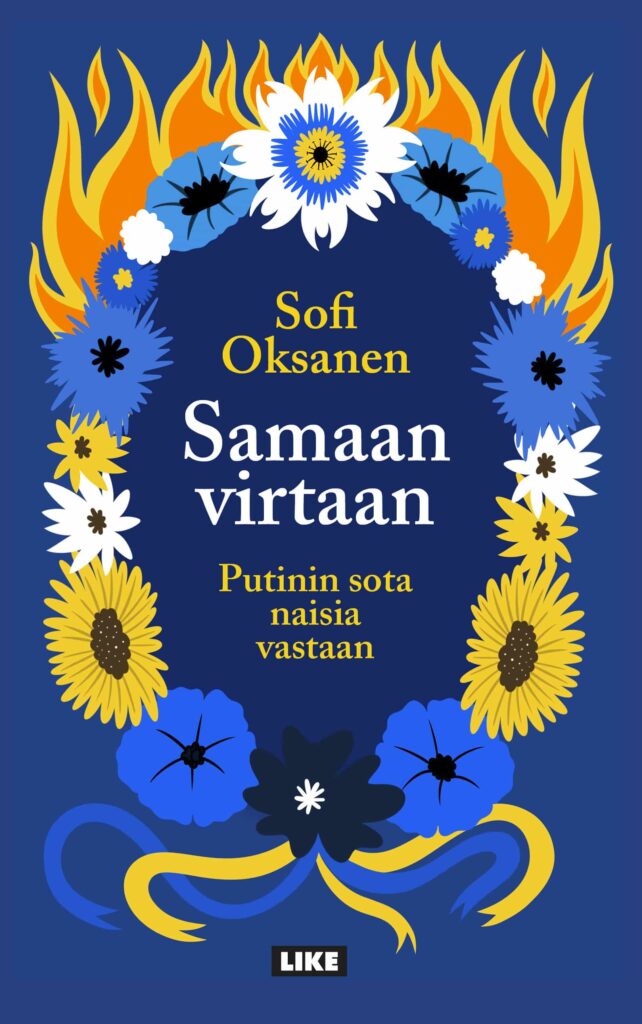
Samaan virtaan – Putinin sota naisia vastaan Same River, Twice – Putin's War on Women
Blending the journalistic rigor of Masha Gessen with the call to action of We Should All Be Feminists, a searing denunciation of Putin’s Russia, revealing how modern Russia’s history of weaponizing sexual violence against women plays a crucial role in its current strategy to retain political influence and dominance abroad
On March 22, 2023, the Swedish Academy organized a conference on threats to democracy and freedom of expression featuring a slate of distinguished speakers including Arundhati Roy, Timothy Snyder, and Sofi Oksanen. Oksanen’s address—entitled “Putin’s War on Women”— would go on to spark such interest that the acclaimed Finnish writer felt compelled to return to it as the basis for a larger, more in-depth look at Putin’s threat to women. The result is Same River, Twice, a devastating book-length essay that incisively builds on the themes and arguments first presented in her powerful speech.
Through Oksanen’s sober analysis a disturbing picture emerges: under Putin, misogyny has become foundational to the state’s power. It underpins the current regime, serves as a means of weaving international alliances, and forms an essential part of Russia’s ongoing genocide in Ukraine, in turn posing a threat to the rights of women and minorities worldwide. As threats to democracy grow stronger across the globe, the powerful and timely Same River, Twice is a warning that cannot be ignored.
“Growing up on the lines that straddled the Western world and the colonized nations of the Soviet Union, Sofi Oksanen recognized that the borders colonialism drew on maps crossed bodies, too – especially the bodies of women. In Same River, Twice, one of Europe’s leading novelists uses her personal experience to shed light on the personal experiences of others: ordinary women trapped in the crossfire of a great geopolitical game.”
–Benjamin Moser
“This brutally honest book explores the history of war crimes, especially the history of rape as a war crime. But its scope transcends Russia, and today’s war in Ukraine. After turning its last page, I was left speechless. Same River, Twice helped voice my own feelings toward everything that war, any war, entails, as well as any repressive regime for which there are no questions of morality. It’s one of those books that can truly change a reader’s life. At the very least, it will forever transform one’s attitudes toward concepts such as “war” and “justice”. A powerful, unforgettable read.”
–Andrey Kurkov
Awards
| Longlisted for the Moore Prize for Human Rights Writing UK | 2025 |
Reviews
-
“Same River, Twice is thoughtful, instructive and deeply harrowing. /…/ The book makes a compelling case that misogyny and imperialism are linked.”
-
“The result could feel rushed or relentless. But readers will appreciate Oksanen’s elegant, passionate wordsmithery, ably translated by Owen F Witesman. /…/ The book’s strongest point is fitting the suffering of Ukrainians into a bigger picture.”
-
“Oksanen’s prose resonates with clarity and conviction. She vividly draws connections between seemingly disparate systems, practices, and historical events to create a comprehensive portrait of power that reads like a revelation. An exquisite feminist critique of Russia’s oppressive tactics.”
-
“Sofi Oksanen is an exceptionally innovative and powerful writer. […] This is indeed a book well timed for International Women’s Day on 8 March. /…/ Same River Twice makes your heart pound – and you will never again follow news from Putin’s war of aggression in Ukraine without thinking about the bestialities that are documented. ”
-
“A rigorous essay /…/ The author of “Purge” draws methodically from extensive and finely executed documentation. The entire book sparks with rage and sharp lucidity /…/ The way Oksanen intertwines the erasure of peoples and the destruction of an individual’s life encapsulates the power of the book.”
-
“In her masterpiece Same River Twice – Putin’s War Against Women, Sofi Oksanen completely unfolds the part of evilness that is often suppressed in our coverage of and settlements after a war. [Oksanen] spares no one. /…/ Sofi Oksanen is a tireless documentarian of the abuse and crimes that Moscow, both historically and to this day, commit against women in particular. We get close. Very close. Uncomfortable close. /…/ The strength of [Same River Twice] is in the details. Straight to the point. /…/ [Same River Twice] is tough, but necessary, reading. /…/ [Same River Twice] is an excellent book.”
-
“With [Same River Twice], Oksanen does not only lend a voice to her great aunt; she does it with such anger that the letters tremble on every page. /…/ The source material is there, and [Oksanen] draws on the latest research. And if one wishes to understand what the war in Ukraine is about, it is wise to listen closely.”
-
“Sofi Oksanen’s essay is thoroughly documented. When she analyzes Russian history and Soviet propaganda in light of the war in Ukraine, and concludes that an old pattern has been given new nourishment by the species “Homo Putinicus”, i.e. by brainwashed nationalists, it is enough to cry. Or roar with rage.”
-
“Sofi Oksanen paints with both broad and narrow strokes in her analysis of how Russia has turned sexual violence into a deterrent weapon across generations and national divides. /…/ [Oksanen] cleverly works the smaller story into the bigger one, which she has an extremely good knowledge of, she presents one horrific example of abuse after another, and she draws on her own family’s history to visualize how war trauma is inherited through generations. /…/ Perhaps most importantly, she tries to illustrate to the Western reader (…) that, as in [Russia’s] previous wars, [Putin] is using Russia’s old playbook for imperialism; that from an Estonian perspective it feels like a replay button is being pushed. /…/ With her essays, [Oksanen] tries to make the world as it is seen from the Kremlin a little bit more recognizable to the Western consciousness.”
-
“Sofi Oksanen – the gloomy and yet so insightful and vigilant voice of the north! Hardly anyone in Finland writes as politically as she does, tracing the lines of pain in history in order to understand the present and gaze into the future.”
-
“It seems that most European and North American decision makers are not really listening. Perhaps because they haven’t read Finnish Estonian star author Sofi Oksanen’s literary essay Same River Twice – Putin’s War Against Women. /…/ [Same River Twice] is especially powerful when it focuses on the West’s shared responsibility for the war. /…/ Oksanen delivers an apt description of how Russia views itself and several of its neighboring countries. /…/ Sofi Oksanen’s [Same River Twice] is at its best when she describes the border between the aggressor Russia and its neighboring countries and victims.”
-
“Each chapter is an essay that stands well on its own; the alternating between the personal and the broader contexts allows a partly incomprehensible reality to become understandable for the reader. Collectively, the texts in the book form a highly convincing document. [Sofi Oksanen] shows us how misogyny is a premise for the totalitarian dictatorship, employing the systematic approach of a researcher and the insight of a novelist.”
-
“There is something paradoxically liberating about Oksanen’s pure, fearless indignation at the evil of this world, about the way she insists on peeling away technique and grand politics and taking the war back to being a question of morality and of good and evil. /…/ The approach is essayistic, personal, and indignant. /…/ Linguistically, [Same River Twice] is powerful when it is carried by indignation.”
-
“A good indicator of how big of an impression a book has made is the need to recite its main points for anyone who will listen. With Sofi Oksanen’s Same River Twice – Putin’s War Against Women (…), my need for [recital] has been something out of the ordinary. /…/ I had great expectations on [Same River Twice], because Oksanen is a wonderful writer (…). In Same River Twice, Oksanen shows that she is just as great at writing an essay [as she is writing novels]. Example by example, and reference after reference, she supports her argument that the goal of misogyny is that women shall lose their voices so that those in power can remain in power.”
-
“Same River Twice: Putin’s War Against Women, an essay that delivers, with composure and method, information about sexual crimes committed in Ukraine, the figure of the Russian male, and the misogynistic policy of the state.”
-
“[Same River Twice] works as an introduction to many of the themes that Oksanen has previously dealt with in her novels. /…/ Oksanen ties everything together into a thought-provoking story, where previously overlooked historical events are put into perspective for highly topical issues about Russia’s ongoing war in Ukraine. /…/ Even though many of these crimes have been described in numerous media outlets a mere two years ago, there is something about Oksanen’s descriptions that makes you feel like you’re reading about them for the first time.”
-
“Hair-raisingly fierce and extremely relevant, but above all, it is brilliantly knowledgeable.”
-
“Overall, Oksanen’s argument is convincing and connects to a larger renegotiation of the concept of colonialism. /…/ Same River Twice invites to a bigger discussion on how European – or perhaps Eurasian – history should be understood.”
-
“With this book, Sofi Oksanen is definitely a rising star in the essay field. /…/ Oksanen brings a top-quality work to the field of Finnish essays, which will certainly generate discussion and gain international attention as well.”
-
“In a time where Ukraine’s struggle has been moved to the dark corners of the news and international support falters, [Same River Twice] is inalienable.”
-
“Oksanen’s fresh approach is anything but theoretical word-twisting. The book is full of interesting examples, experiences and events, which altogether make the themes palpable and influential. The Russian imperialism rises to be the key concept.”
-
“Oksanen’s essays are both convincing and insightful. With a gentle hand, [Oksanen] moves between the present and the past, personal stories and hard facts. The long lines she draws shed light on the historical continuity from Soviet until today, and the focus on women highlights often neglected aspects of power. /…/ Oksanen’s historical perspective evokes the question how our present time (…) will appear through the rearview mirror.”
-
“Sofi Oksanen is not silent. On the contrary. She is a literary star in her homeland, one of the most prominent authors at the breaking point between what we call the West and Russia. /…/ In [Same River Twice], [Oksanen] manages the feat of expressing her anger in an emotional way and at the same time analyzing the war in Ukraine and, above all, its history in a very calm way with numerous sources. /…/ It is painful, but it is worth listening to Sofi Oksanen.”
-
“[Same River Twice] is a comprehensive and carefully researched essay.”
-
“[Oksanen is] one of the most important voices in contemporary literature. /…/ She acts as a ruthlessly drastic chronicler of violence against women in times of occupation and war.”
-
“[Same River Twice] can have a real impact, even though it’s just words. Even though the book deals with difficult topics, Oksanen’s great writing skills manages to engage the reader.”
-
“[Same River Twice] is eye-opening, filled with pathos and with a style that makes every word glow on the pages. /…/ [Same River Twice]’s perhaps biggest merit is that it views Russia’s violence against its neighbors through a post-colonial lens.”
-
“With its two hundred references, [Same River Twice] could have been a heavy read, but Oksanen writes vividly. /…/ Same River Twice places Russia’s war in Ukraine in a postcolonial and feminist context. It’s freeing, because reports risk getting stuck in geopolitics and militia. /…/ The chapter depicting Russian troll farms’ meticulous efforts to shatter the feminist movement is especially interesting. /…/ Oksanen has written a text that opens up to conversation where there is now silence.”
-
“With a clear and detailed language, Oksanen manages to depict Russia’s history of populism and propaganda, Kreml’s oppression of women, and how these factors increase the use of sexual violence as a weapon. /…/ Same River Twice is a relevant book today, and it will be a relevant book tomorrow. Where it goes into detail on Russia’s use of sexual violence, it is equally relevant when looking at the rest of the world.”
-
“[Same River Twice] is something much more fundamental than a current confrontation with a time-specific and named tyrant /…/ Yes, [Oksanen] details events happening now, in this ongoing reality. /…/ [But Same River Twice] is a necessary depiction of something worse than the evilness of one person. /…/ I can’t stop quoting – it’s because everything in [Same River Twice] must be read. With pauses, yes, to be able to take it all in. With eyes that sometimes shut, reflexively, to protect the soul. But which are forced to open again. A book that cannot be put aside because the lilac blooms, nor because the evening is blue and tepid.”
-
“Sofi Oksanen is an intellectual who pushes her topics to their very limit. /…/ Sofi Oksanen can be placed side by side with postcolonial authors like Salman Rushdie, V S Naipaul, and Chimamanda Ngozi Adichie. /…/ Reading Same River Twice is as horrid as it is clarifying. Sofi Oksanen listens – and never looks away. She is without a doubt one of our time’s most important voices.”
-
“Same River Twice is a strong manifesto from an outspoken author who knows the details of this colonial power’s oppression of women and censorship.”
-
“[A] passionate indictment, the result of intensive research. /…/ [Same River Twice] vividly shows how the Russian power apparatus of the army and secret services deliberately use sexual violence against women (and men). /…/ Oksanen confronts us with shocking scenes and disturbing truths. She appeals to the conscience of the world to look and not remain silent. [Same River Twice] is a wake-up call through the power of her portrayal – and a perspective on the future: unlike in the past, atrocities are now documented.”
-
“[A] shocking analysis. /…/ [Oksanen] wants to give the victims a voice. It is difficult to read about this much suffering (…) but that is exactly what makes the text so important. At times it seems like a hastily written incendiary pamphlet (…), but that reflects the urgency (…). The author’s anger is unmistakable.”
-
“Same River Twice is written with intensity and energy. [A] highly readable non-fiction book about a leader and a country on which we must have a sharp spotlight.”
-
“With Same River Twice, [Oksanen] has written an incendiary pamphlet against Russia (…). [S]traightforward and angry.”
-
“[A] thoroughly factual and analytical book /…/ [A] moving, stirring book.”
-
“With Same River Twice, [Sofi Oksanen] has written a knowledgeable and analytically sharp essay on a difficult topic.”
-
“Razor sharp analysis of the Putin regime’s systematic oppression of women. Point by point, Oksanen proves how Putin knowingly has built his empire on sexual violence, disinformation, and weakened rights for women. The image of Russian imperialism and misogyny, homophobia, and nationalism as one unit is terrifying and important to contemplate.”
- Author
-
 Sofi Oksanen
Sofi Oksanen
- Published
- 2023
- Genre
-
- Literary essay
- Pages
- 240
- Reading material
Finnish edition
English translation
- Rights sold
-
Croatia, Fraktura
Czech Republic, Euromedia
Denmark, Lindhardt og Ringhof
Estonia, Varrak
Finland, Like
France, Stock
Germany, Kiepenheuer & Witsh
Hungary, Scolar
Iceland, Forlagid
Italy, Einaudi
Norway, Kagge
Portugal, Objectiva
Romania, Polirom
Spain, Salamandra
Sweden, Albert Bonniers
Ukraine, Komora
US, HarperVia (World English)
